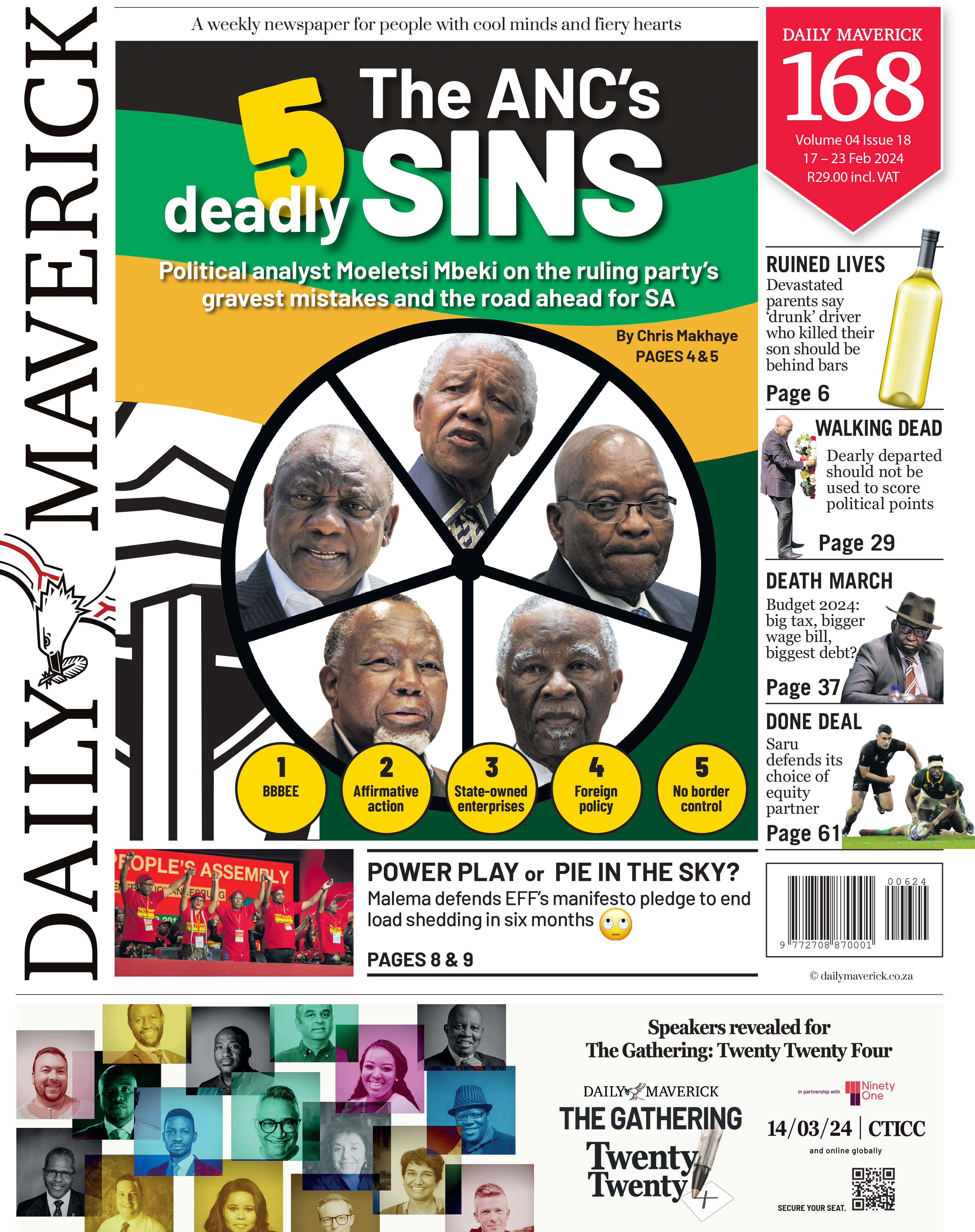Prepare to have your brain bombarded with election poll crunches and predictions in the coming months. Pie charts will dominate with percentages colourised, and graphs will rise and fall like a heart monitor.
In the meantime, by-election results in far-off places will be scrutinised, analysed, fed into a machine, contemplated like precious, revelatory findings and ladled back at us like maps to a promised land.
You will be fed many predictions. Some will be close, some spot-on, many way off the mark.
Some will predict that the ANC will drop below 50%, others that the biggest threat will be Zuma’s new MK Party, while the EFF, some reckon, will ride a tide of Trumpian populism, the DA will dip to 17% and the IFP to a mere three percent.
Don’t wager any bets at this point. There are sleepers out there who might surprise. And by that we mean the voters.
Backwards never
In the meantime, everyone is talking coalitions. It’s the way forward. Backwards never!
By the time we vote (the date in May is yet to be announced) we’ll have a clearer understanding of where Rise Mzansi, Change Starts Now and the Multi-Party Charter all fit in.
By December 2023 the Multi-Party Charter had bagged the DA, IFP, the Freedom Front Plus, ActionSA, the Independent South African National Civic Organisation, the United Independent Movement, the Spectrum National Party, the African Christian Democratic Party, the United Christian Democratic Party and the Ekhethu People’s Party. Don’t forget Mmusi Maimane’s Build One South Africa, running independently.
The fact that some 350-odd political parties have registered with the Electoral Commission of South Africa, hoping to contest the 2024 elections, is an indication that we South Africans love us a general election.
We come alive, like when our sporting teams play.
This is evidence of a healthy interest in politics and democracy, and as the country heads into its seventh election, no one really knows what the outcome will be.
Make it work
Whatever the outcome, those who make it past legal thresholds in order to govern the country will at some point have to sit around a table and work it out.
Voters know where the parties in the MPC stand, but there are many dark horses all around. You know, those behind-the-scenes deals voters only find out about when it is too late.
Political parties will have 14 days from the announcement of the election results to form a government.
In this instance, depending on those who make it past the finishing line, this could take some time, and there are bound to be theatrics and stalling.
But as Professor Jaap de Visser, interim South African research chair in multilevel government at the Dullah Omar Institute at the University of the Western Cape, has pointed out, coalitions are nothing new to democratic South Africa.
“The first democratic national government after the 1994 elections was a broad-based coalition – a Government of National Unity.
“There [have] also been coalitions at a provincial level in the Western Cape and KwaZulu-Natal, and there have been coalitions in municipalities, ever since the first democratic local government elections in 2000,” De Visser noted.
Coalitions only became “a major issue” in the 2016 and 2021 local government elections, when an increasing number of municipalities, including the country’s largest cities, had to deal with “hung councils”, where no single party could claim a majority of the council seats.
De Visser set out that after the 2021 elections, approximately 70 councils were forced into coalitions, which could indeed deepen democracy or paralyse it, as has been the case in several dysfunctional regions.
Lock ’em up
“Currently, coalition negotiations are too often aimed at short-term and even personal gains. It is too often about what a party or individual can ‘get out of it’ in the form of positions and even financial gain,” De Visser noted.
But in order for this to be sustainable, coalitions have to change. First up, voters are not directly involved when it comes to parties or independent individuals negotiating for a slice of the cake. But there are ways this could be more transparent.
With the two-week deadline breathing down necks after the election, why not, this time round, have a sort of Codesa reloaded (depending on results, we might have outright wins), broadcast live and open to the public, including ratepayer associations and other civic organisations?
If political parties are going to be singing and dancing for our votes in the light of day, what they do after we surrender our X is also our business. DM
This article first appeared in our weekly Daily Maverick newspaper, DM168, which is available countrywide for R29.

DM-17022024-001.indd
















 Become an Insider
Become an Insider
Comments - Please login in order to comment.